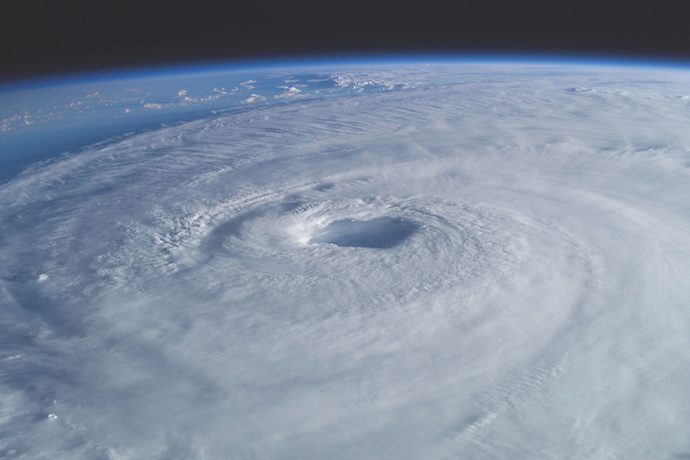Amid all the ruminations and critiques of the Nashville Statement, one aspect sticks out to me as particularly curious: the timing. Why did the Council on Biblical Manhood and Womanhood choose this precise moment to trumpet evangelical Christianity’s longstanding, categorical opposition to LGBT identity?
Sure, some LGBT people had been enjoying a modicum of normalization in American society (at least before January 20). And although the statement was likely in the works long before the latest onslaught of natural disasters, the coincidence of its delivery, on the eve of the one-two punch of Hurricanes Harvey and Irma making U.S. landfall, illuminates precisely the panicked mindset that suggested such a proclamation was necessary in the first place.
The Nashville Statement does seem to alleviate a specific kind of spiritual anxiety that this precise moment induces. Hurricanes Harvey and Irma represent loss of life, danger, tragedy—they are a threat to life, but also a threat to an understanding of the natural order. When faced with such threats to their understanding of the world, certain strands of evangelicals are prone to view the Nashville Statement as a solution to the natural instability represented at this moment by Harvey and Irma.
According to that same peculiar logic, material suffering—especially due to natural events—is the divine punishment of all for the transgressions of a few. The prosperity gospel interpretation of nature means that the devastation wrought by Hurricanes Harvey and Irma cannot be explained through climate change—even if one acknowledges its existence. Material destruction on the order of Harvey must be explained theologically as God’s wrath. On this theological account, the instability of nature is caused by humans; deadly storms that strike the U.S. with increasing frequency are caused, not by carbon consumption, but by sexual immorality.
This is, of course, an argument that will sound familiar to anyone fluent in right-wing religious rhetoric—Right Wing Watch recently documented “POTUS Shield” member Rick Joyner and “end times prepper” Jim Bakker directly connecting the devastation in Houston (and literally “everything else on earth”) to “sin and wickedness.” This reasoning comes so readily to right-wing figures that self-proclaimed “good Christian” Ann Coulter was blaming Houston’s former mayor, out lesbian Annise Parker, for Hurricane Harvey while the floodwaters were still rising.
I don't believe Hurricane Harvey is God's punishment for Houston electing a lesbian mayor. But that is more credible than "climate change." https://t.co/K7d7mopY5Q
— Ann Coulter (@AnnCoulter) August 29, 2017
At the very least, Coulter, Bakker, Joyner, and, the authors of the Nashville Statement are acknowledging the contemporary truth of nature’s instability. But the interpretation of (and response to) that instability is where the theology gets sticky. So let’s start with the basics: how do we know that nature is stable?
The Nashville Statement contends that we know that nature is stable because God created it. Accordingly, this stability can be reinforced by humans assuming the “appropriate” role within nature—which requires gender complementarity. But like so much theology that is bent out of shape to exclude whichever group is deemed “undesirable” at a given moment, the Nashville Statement is forced to go to great lengths to cherry-pick portions of the creation story to justify its exclusionary rhetoric. It insists that Genesis 1—and not Genesis 2-3—is the foundational stability for nature and human sexuality. The statement proclaims that humans are created male and female as a procreative pair, rejecting the theological understanding that gender differentiation is a consequence of what many Christians would call “the fall.”
And how do we know that the instability of nature is God’s wrath? Well, there are centuries of biblical interpretation that link sexual immorality to God’s use of nature to destroy the offending parties. Consider the long-standing interpretation of the Sodom and Gomorrah story as God’s punishment for homosexuality. That link is so strong that the word “Sodomites” is still synonymous with “homosexual” in some religious communities.
But the text itself doesn’t point the finger at men engaging in homosexual sex, which is absent from the story. The “sin of Sodom” is xenophobia and attempted gang rape. Interpretations such as these, where God destroys entire population centers ostensibly due to homosexuality, surely fuel the theological imagination of contemporary evangelicals. As they say, it’s easier to point out the motes in other people’s eyes.
But this theology is just evidence of lazy thinking, not to mention hopelessly pre-modern. Since the Lisbon Earthquake of 1755, most Christian theology has moved away from ascribing natural disasters to God’s wrath over “unnatural acts.” The prevailing questions have been focused on different aspects of theodicy and the problem of evil.
But some evangelicals have persisted in blaming the victims of natural disasters for their situations. On this logic, those who lose everything due to Hurricane Harvey or Irma have either engaged in unnatural sexual behavior—or supported those who do (which the Nashville Statement categorizes as an equally grievous sin). This victim-blaming theology was popularized in Phyllis Schafley’s 1978 declaration that gays were responsible for the ongoing drought in California. But since then, there’s always been an American evangelical who’s ready to stand in front of a camera and blame LGBT people for natural disasters.
Ultimately, this reinforcement of gender complementarity and the divine origin of gender differences, framed as a crucial part of what is good about the natural world God created, is a simple re-entrenchment of a position that confirms the stability of the natural world. Unfortunately, as natural disasters continue to worsen due to climate change, we can expect to see more attempts to reaffirm the “natural” or “Godly order” of the world (like the Nashville Statement), along with increased scapegoating of marginalized communities for their role in putting the U.S. in the path of God’s wrath.
To be clear, like other writers on RD, I also think the Nashville Statement is stupid and unnecessary. And as a lesbian minister, I’m also out of fucks to give about what evangelicals think about sexuality. The last of my fucks evaporated after the most recent presidential election, which made public what many already suspected: evangelicals only police the sexuality of vulnerable and marginalized populations to argue that they must be the source of their own suffering.
When faced with a “successful” straight white man who has children by multiple wives, is a serial adulterer, and brags about assaulting women, white evangelicals were all too eager to point to that man’s material success as more than enough goodness to overlook his flaws. In fact, as the prosperity gospel teaches us, having material wealth is a sure sign of God’s favor. And losing all of your material wealth in a natural disaster? Well, that’s surely a sign of God’s judgment—so brace yourself for the victim-blaming aftershocks.




